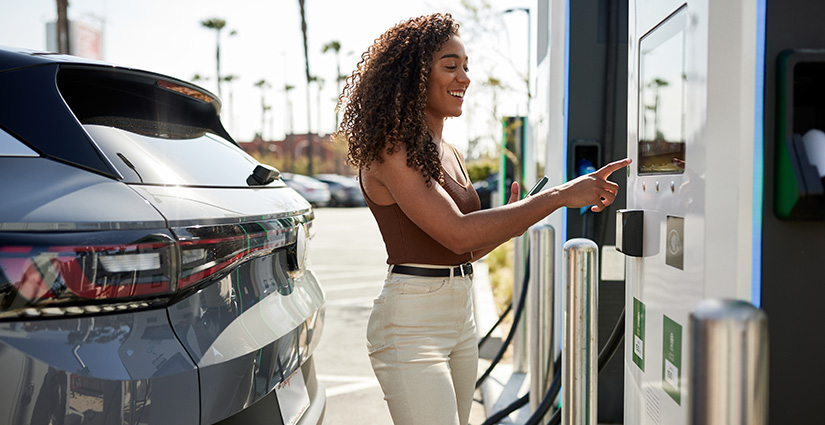NREL Supports Efforts To Solve Drivers' Electric Vehicle Charging Experience Challenges

It has never been easier to locate a public charging station, but finding one that functions properly can still be a frustrating reality for many electric vehicle (EV) owners. Like many new ventures, today's U.S. EV charging network is troubled by reliability issues, with roughly one in five public charging attempts by drivers failing.
With EV adoption rapidly on the rise, these challenges need immediate attention and innovative resolution to keep drivers' experiences positive and support an expanding national network of chargers along America's highways and within communities. Enter the National Charging Experience Consortium (ChargeX Consortium)—a new collaborative effort between three U.S. Department of Energy national laboratories to rapidly solve complex EV public charging challenges. The ChargeX Consortium was established to ensure that all Americans have access to frictionless and reliable EV charging.
Funded by the Joint Office of Energy and Transportation, the ChargeX Consortium includes a team of researchers from the National Renewable Energy Laboratory (NREL), Argonne National Laboratory, and Idaho National Laboratory (INL). The national laboratories, led by INL, will collaborate with a cross section of the EV charging stakeholder community to address major charging experience challenges over the next two years.
The ChargeX Consortium will tackle EV charging issues by a methodological approach to:
- Define the charging experience: The national laboratories will leverage data and insights from consortium participants to create key performance indicators of the charging experience. The data will enable the labs to measure U.S. charging performance in order to identify and pursue the optimal public charging experience.
- Triage charging reliability and usability: This effort will help understand root causes and efficient solutions to problems that prevent consumers from successfully charging.
- Develop solutions for scaling reliability: The labs will leverage input from consortium participants to design new diagnostics and testing tools that help ensure charging success as the number of EVs and chargers rapidly expands.
NREL will primarily lead the effort to find solutions for how to triage charging reliability and usability, including additional work to define the charging experience and create solutions for scaling reliability. Kristi Moriarty, a senior transportation researcher at NREL, will help lead the laboratory's ChargeX Consortium efforts.
"The transformation of American transportation relies heavily on the consumer charging experience," Moriarty said. "EV charging infrastructure needs to be supported by chargers that work the first time a consumer plugs their car in. NREL's contributions to the ChargeX Consortium will help ensure uptime standards are met by identifying top pain points and causes of failure, then developing solutions to significantly enhance reliability and usability."
Kicking Off the ChargeX Consortium With an EV Road Trip
This unprecedented effort to solve complex charging experience challenges has already required involvement from multiple stakeholders. Initial efforts by NREL included helping to bring aboard industry organizations. There are more than 50 industry partners, including vehicle and EV charger manufacturers, charging station operators, charger repair companies, software/roaming providers, consumer advocacy organizations, payment companies, and universities.
Before the ChargeX Consortium officially kicked off this June, national laboratory staff also participated in an EV road trip in California. Members from each national laboratory took different routes, where they experienced charging experience pain points that the ChargeX Consortium is actively working to address.
"The road trip allowed us to encounter charging challenges firsthand," Moriarty said. "We experienced broken and inoperable chargers and at some stations had to try more than one method of payment. The experience gave us a window into what current EV owners encounter on a regular basis."
Future road trips like this will be a necessity to continue monitoring real-world challenges and to spur ideas for improvements, Moriarty said.
NREL's Work To Improve the Customer Experience
While there are multiple EV charging issues to tackle, NREL is starting with a focus on top root causes of failure, component hardware testing, and payment processing. Payment challenges remain a top pain point in the charging experience. NREL will work with industry and the other laboratories on intuitive fixes to improve the ease of payment.
"The ChargeX Consortium is focused on the customer experience," Moriarty said. "People expect EV charging to be as easy as refueling at a gas station. Poor reliability and payment issues are amplified through social media platforms. The NREL team is working quickly to resolve these issues and ensure consumers are successful each time they plug in their vehicle at a public charger."
Industry input has also led NREL to conduct investigations and testing of hardware. Multiple automotive original equipment manufacturers have announced a change in the standard connector they will use. To increase the durability and safety of charging adapters and cable connectors, NREL will lead validation efforts to potentially inform the creation of future, universal standards for this type of hardware. NREL will also help solve user interface issues and significantly reduce common challenges, such as communication issues between the charger and the vehicle cloud.
The laboratory will also contribute to efforts related to common error codes, diagnostic definitions, best practices, and enhancing current standards that may be lacking. NREL researchers will seek to discover customer pain points and analyze the root causes to pinpoint the most common engineering issues for EV charging.
NREL's support of the ChargeX Consortium will directly contribute to the Joint Office of Energy and Transportation mission to accelerate an electrified transportation system that is affordable, convenient, reliable, and safe and fulfills a specific mandate to plan, coordinate, and implement data sharing to inform the buildout of a national charging network. Stay tuned for future ChargeX Consortium updates.
Learn more about NREL's sustainable transportation and mobility research and the Joint Office of Energy and Transportation. And sign up for NREL's quarterly transportation and mobility research newsletter, Sustainable Mobility Matters, to stay current on the latest news.
This article has been updated to reflect an editorial change made after its original publication.
Last Updated May 28, 2025
